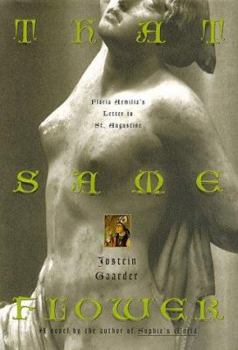Vita Brevis: Floria Aemilias Brev til Auriel Augustin
Select Format
Select Condition 
Book Overview
In his first and most famous novel, Sophie's World, the Norwegian Jostein Gaarder took on the entire history of Western philosophy, neatly sandwiching Socrates, Sartre, and everybody in between into a... This description may be from another edition of this product.
Format:Hardcover
Language:English
ISBN:0374253846
ISBN13:9780374253844
Release Date:January 1998
Publisher:Farrar Straus Giroux
Length:167 Pages
Weight:0.60 lbs.
Dimensions:0.8" x 5.3" x 7.5"
Customer Reviews
5 ratings
A good philosophy book...
Published by Thriftbooks.com User , 19 years ago
First of all, as another user has said, this book was written by Gaarder, not by Floria. At the beginning, Gaarder says that he found an old document from the XVI century in a bookstore in Argentina. He bought the document because he thought it was a letter written by Floria, a woman who was St. Augustine's lover when they were both young. Just ignore what Gaarder says about how he found the document, because that's something he made up from his mind. Now onto the book. Gaarder uses Floria to refute a lot of Augustine's ideas about virtue, sins, chastity, celibate and the relationship between God and men. Gaarder's philosophy is the opposite of Augustine's: Whenever Augustine says to ignore the beauty of the world because it may lead you to sin, Gaarder will tell you to enjoy it because it's God's creation. The purpose of Gaarder is to show us the true nature of Augustine's ideas, more close to those of the asceticism than to Christianity (he is even ashamed for enjoying food, for Christ sake!). To deny the human nature is to deny the works of God, it was never His purpose to build a beautiful world just to demand us to ignore it. You may be in disagreement with Gaarder's ideas, but at the end this is a great book and the best of it is that you will be anxious to know more about St. Augustine's life and works. I recommend you to look forward for The Confessions of St. Augustine, so you can have the whole picture and learn about a man that shaped modern morality like few people have been able to do. You won't regret it.
Buy it!
Published by Thriftbooks.com User , 21 years ago
Unlike some of the other reviewers, it seemed clear to me that the "introduction," "postscript" and footnotes that others assumed where "true" are part of the text and are also fiction. Gaarder did not find these letters; his story of finding them is part of the story (here he is honoring Jorge Luis Borges). It is a short, but deeply intriguing story. The book does raise serious concerns about elements of Augustine's theology (especially the doctrine of creation; is creation good?). At the same time, it tells a painfully truthful story of lost love.
Moving, unexpected book
Published by Thriftbooks.com User , 23 years ago
I devoured this strangely moving book in about two hours, stranded inside a car during one of my former boyfriend's windsurfing forays - and closed it with a curious mixture of lingering anguish and that joy that sometimes comes with absolute recognition. The love story depicted here is very touching and anything but predictable. Some deep truths concerning love, endurance and the making of choices, are conveyed here through Floria's long-vanished voice.
The story of a woman's life
Published by Thriftbooks.com User , 24 years ago
First of all, I have to say, I read this book in German, which is my native language. And I loved it. It touched me very much, how this woman loved her man so deeply and lost him to dogmata and guilt-feelings towards his mother. I was never very intrested in the saints of the catholic church and I don't know, how realistic this book is. And - honestly - I don't care. All I know is, that it touched me as no other book did before. I understand Floria. And I can only recommend it to everybody, who searches for bigger emotions in his life.
an alternative view
Published by Thriftbooks.com User , 24 years ago
"vita brevis" holds controversial issues concerning one of the most renowned saints in the catholic church. gaarder puts forward an alternative view to salvation and its hold on st augustine.the book is structured based on the views of the catholic faith from an athiest perpective with the loss of a woman's man to his faith. clearly documented with footnotes to hold its authenticity, leaving the reader (especially catholic readers) to question whether the letters are true or not.gaarder beautifully pieces the letters, intertwining faith and worldly philosophy and questions its opposing relationship formed within humans.if you're up for serious reading and religious insight, don't let this book pass you by!






